Okavango Delta
Okavango delta is yet another interesting land mark in Botswana, Previously known as the okovango . The Okavango delta is a swampy delta found in Botswana southern Africa, formed as a result of river Okavango getting to the tectonic trough of the endorheic basin of the Kalahari desert. Its formations resulted from the flowing water of the river getting evaporated and later transpired and not getting into any ocean or sea. Annually approximately 11 cubic kilometres of water spreads spanning over 6000km2 to 15,000km2 area. Some of the water gets soaked into lake Ngami.
As you extend further to the eastern part of the delta , there exists moremi national reserve a national park filled with wildlife attractions making the delta area rather an unmatched attraction. The delta also holds a record of being the 7th natural wonders of Africa and also doubled as being the 1000th wonder by UNESCO world heritage sites.
Logoons in the Okavango Delta
The Okavango lagoons form as a result of the water levels going down and thereby remaining in some places such as canals and river beds, water holes therefore drawing several wildlife to the areas. Some of the big lagoons in okavongo delta include moanachira logoon, jerejere lagoon or hippo pool, guma lagoon, shinde logoon, xakanaxa lagoon ,xhamu lagoon, xhobega lagoon, xugana lagoon, dombo hippo pool, gxodikwe logoon among others.
Salt Island.
The delta contains dramatic features and one of them is the salt island. The accumulation salt in root of the plants lead to the formation barren white patches in the centre of several islands within the delta making some island unfit to support plant life besides the salt resisting palm trees that have thrived in salt islands.
Climate of Okavango Delta.
The lush green vegetation of the Okavango delta is not as a result of the heavy rains or wet seasons but rather an oasis of the semi-arid environment. The delta receives a yearly rainfall of up to 450mm and the rainy season runs from December to March and frequently in the afternoon thunderstorm.
During the months of December thorugh to February, its termed as hot and wet months with temperature rising to 400c during the day and in the night the humidity is between 50 to 80%. As months advance through March to May the temperature become more bearable with the highest being at 300c and in the night the temperature are cooler. From June to August, the rains disappear and area enters into what is termed as dry winter, characterised by cold nights, where during the days the temperatures are mild to worm then as it gets to sun set/ dusk the temperature remarkably drop almost to freezing point. During the months of September to November, the temperatures are hot and atmospheric pressures builds up. As the months subside to the rainy season and October being a tough month especially for the park guests/ visitors since temperature go to 400c and the day sometimes receives sudden outbursts of thunders.
Wildlife at Okvango Delta
Okavango being filled with lots of diverse tariff and features and its blessed with several wildlife that call it home both permanently and temporarily. Here a list of literally all the wildlife that reside in Okavango Delta. Lions, African bush elephant, rock hyrax, African wild dog, red lechwe, Angolan giraffe, black rhinoceros, vervet monkey, East African cheetah, sable antelope, South African giraffe, Hippos, common warthog, honey badger, African buffalo ,white rhinoceros, bat-eared fox, blue wildebeest,olive baboon, chacma baboon, Africa leopard, springbok, Thomson gazelle, caracal, serval sitatunga, kudu, nile crocodiles, spotted hyena, brown hyena, gazelles, meerkat, African , water buck, spotted hyena, tsessebe, grysbok roan antelope, , greater kudus, gemsbok impalas, sharpes, water buck , serval ,sitatunga, plain zebras, impalas among others
Birds in Okavango delta.
Okvango delta being a diverse land is filled several bird species to mentions, water birds, forest birds, savanna birds and migratory birds. Some stay the delta while others show up seasonal holding other factors constant. The birds species amount to 400 species some of which include Pel’s fishing owl, ostriches, egyptina goose, African Jacana, wattled crane, breasted roller, crested crane, helmeted guneafowl, African fish eagle , marabou stork , African spoonbill, Hornbills, African darters, south African Shelduck.
Activities done at Okavango delta.
Mokoro excursions: The okavongo delta is known for its mokoros, the mokoros are traditional boats that are used to take rides in the lagoons, one of the most thrilling ways to access the swampy lagoons of the delta. The mokoros are crafted locally from the large trees at the delta, but today the mokoros are made from fiber plastic replicas in orders to the stop the cutting of trees which is a threat to the environment. The boat rides with the mokoros are the best way to conduct game drives at the delta since they are not motorised so they simply glide on the water and don’t make noise which could scare the wildlife a way . Therefore it makes it easy to see the sitatungas. Hippos, crocodiles, elephants, buffaloes as they feed around the delta.
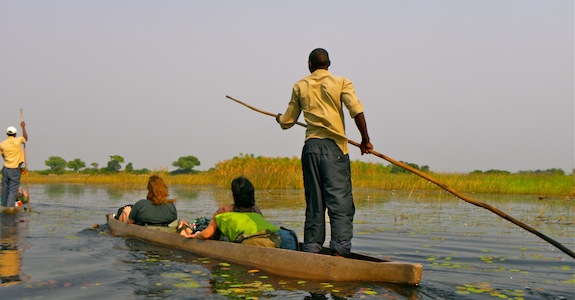
Guided walks: another interesting aspect of viewing the wildlife and several sceneries at Okavango delta. The guided walks are done in the morning so as to avoid temperature advancement that brings about the heat during the day, they are conducted by experts who are very much experienced and exude wealth of knowledge. While on the guided walks you will be position to track down elephants and other wildlife in the area.
Game drives: game drives is yet another perfect way of mingling and experiencing the wildlife at Okavango delta. The ability to do game drives in the delta depends on the camps that one is in as well the as the seasons (wet and dry seasons) some camps are situated in dry areas therefore offer game drives. Other camps are located in private concessions therefore do offer day game drive and night game drives which is a perfect time to view some t nocturnal such as leopards, aardvarks, aardwolves as well as lions that hunt at night. The game drives are conducted by knowledgeable guides who know where to find what and when to find them.
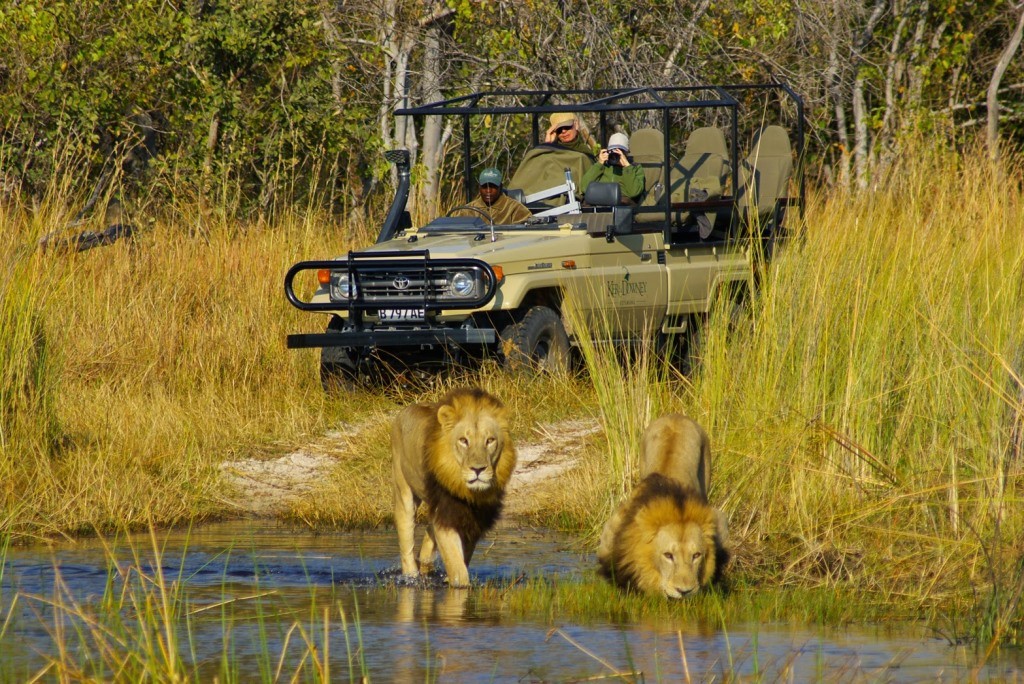
Horseback safaris: horse backs safaris is also another way to experience the Okavango delta, but one ought to be an experience rider to be able to conduct horseback safaris, since the terrain most times is slippery and they need to know how control the horse back should they spook. Horse rides are pretty much interesting as they take you further where you will be walking along with other four legged creature such as the zebras, lechwes sittings you will also see giraffes scampering across you sight the ease of seeing wildlife in the horse rides is also partial attributed the fact that you also perceived by the animal as part of them. Make sure while on the horse ride follow instruction from your guide since predators won’t be afraid to get close to you because of territorial mutuality, horse ride usually occur in seasonal flood plains in the south west of the delta.
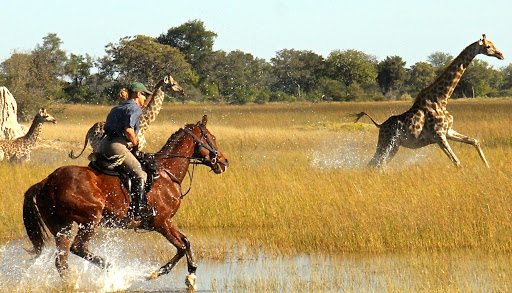
Elephant safaris: elephant safaris were orchestrated in the 1980’s in the Abu region of the delta, but it later phased out due concerns regarding animal welfare. Presently the safari camps simply offer elephant experience which can be equated to the elephant’s safaris, they offer walking safaris with elephants therefore interacting with them which is a thrilling experience.
Boat safaris: boat trips offer a unique experience the Okavango delta, wildlife can be seen from the boat as you take the ride on the delta. The boat safaris sometimes scare the animals away because of the sound made by the motorised boats.
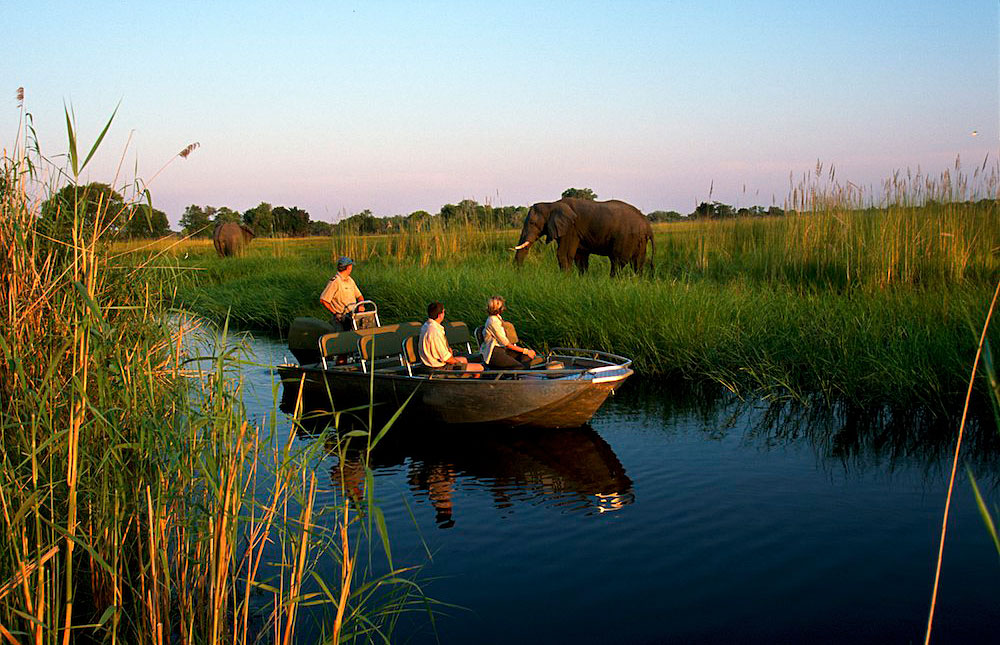
Fishing : the delta also offers perfect fishing opportunity to experience the aquatic life of Okavango delta. Fishing is only conducted in specific area of the delta such as the panhandle area where the Okavango River enters the delta. The fishing is however done on the catch and release basis.
Helicopter rides: helicopter rides is one of the best ways to experience the wildlife of Okavango delta, it offers a 360 view of the delta spotting literally all the wildlife you can see from above. The are planned by the camps for those interested, they have to plan a little bit earlier.

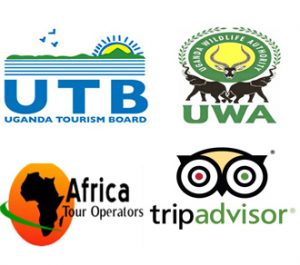


Leave a Reply
Want to join the discussion?Feel free to contribute!